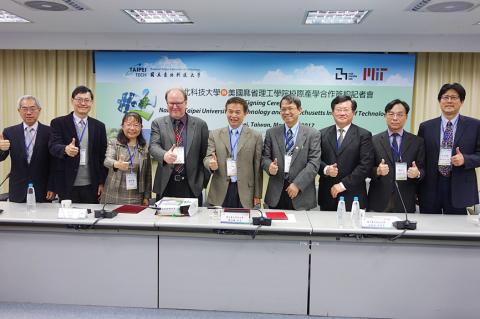The National Taipei University of Technology (NTUT) yesterday signed an agreement with the Massachusetts Institute of Technology (MIT) to set up a “City Science Lab” to focus on the development of “smart” city infrastructure and autonomous vehicles.
MIT City Science Initiative director Kent Larson signed the agreement with NTUT president Li Wen-lung (黎文龍) in Taipei, the first time that the US institute has signed an agreement with a Taiwanese university.
With the growing prevalence of applications associated with the Internet of Things, “smart” city infrastructure plays a key role in industrial development and autonomous vehicles, which involve the development of human-centered concepts, a major indicator of how developed a “smart” city is, Li said at the ceremony.

Photo: Courtesy of National Taipei University of Technology
Li said he hopes the strong research capacity of the two institutes, coupled with the multitude of technology firms set up by the universities’ alumni would provide the collaboration a solid basis.
NTUT is to send six students to programs at the MIT Media Lab each year to acquire knowledge on “smart” city infrastructure, with each program to last for at least two months, Li said.
Lecturers will also be able to use the opportunities to engage in exchanges with MIT counterparts, he said.
Michael Lin (林家樑), a Taiwanese doctoral student who is also a research assistant at the MIT Media Lab said that the two institutes are like-minded, as they both value the idea of “learning by doing,” while the Taipei university has earned its reputation by putting its beliefs into practice.
The two universities plan to embark on projects to improve transportation and housing, Lin said.
The MIT City Science Initiative aims to develop autonomous vehicles that operate like Uber, he said.
It hopes to analyze “big data” regarding commuters’ behavior to create an improved public bicycle system that would save operators the trouble of transporting bicycles from one location to another, he said.
It hopes to provide residents with space-saving homes that include “movable” furniture, Lin said.
He said that he hopes the partnership would serve as a gateway that links MIT to Taiwan’s business sectors, thereby motivating small and medium-sized enterprises to submit innovative ideas to the Taipei institute, through which MIT could engage in reciprocal and mutually beneficial research projects with Taiwanese firms.

Chinese spouse and influencer Guan Guan’s (關關) residency permit has been revoked for repeatedly posting pro-China videos that threaten national security, the National Immigration Agency confirmed today. Guan Guan has said many controversial statements in her videos posted to Douyin (抖音), including “the red flag will soon be painted all over Taiwan” and “Taiwan is an inseparable part of China,” and expressing hope for expedited reunification. The agency last year received multiple reports alleging that Guan Guan had advocated for armed reunification. After verifying the reports, the agency last month issued a notice requiring her to appear and explain her actions. Guan

GIVE AND TAKE: Blood demand continues to rise each year, while fewer young donors are available due to the nation’s falling birthrate, a doctor said Blood donors can redeem points earned from donations to obtain limited edition Formosan black bear travel mugs, the Kaohsiung Blood Center said yesterday, as it announced a goal of stocking 20,000 units of blood prior to the Lunar New Year. The last month of the lunar year is National Blood Donation Month, when local centers seek to stockpile blood for use during the Lunar New Year holiday. The blood demand in southern Taiwan — including Tainan and Kaohsiung, as well as Chiayi, Pingtung, Penghu and Taitung counties — is about 2,000 units per day, the center said. The donation campaign aims to boost

The Kaohsiung Tourism Bureau audited six hotels in an effort to prevent price gouging ahead of Korean band BTS’ concert tour in the city scheduled for Nov. 19, 21 and 22 this year. The bureau on Friday said that the audits — conducted in response to allegations of unfair pricing posted on social media — found no wrongdoing. These establishments included the local branches of Chateau de Chine, Hotel Nikko, My Humble House, and Grand Hai Lai, it said, adding that the Consumer Protection Commission would have penalized price gougers had the accusations been substantiated. The bureau said the Tourism Development Act

BACK TO WINTER: A strong continental cold air mass would move south on Tuesday next week, bringing colder temperatures to northern and central Taiwan A tropical depression east of the Philippines could soon be upgraded to be the first tropical storm of this year, the Central Weather Administration (CWA) said yesterday, adding that the next cold air mass is forecast to arrive on Monday next week. CWA forecaster Cheng Jie-ren (鄭傑仁) said the first tropical depression of this year is over waters east of the Philippines, about 1,867km southeast of Oluanpi (鵝鑾鼻), and could strengthen into Tropical Storm Nokaen by early today. The system is moving slowly from northwest to north, and is expected to remain east of the Philippines with little chance of affecting Taiwan,